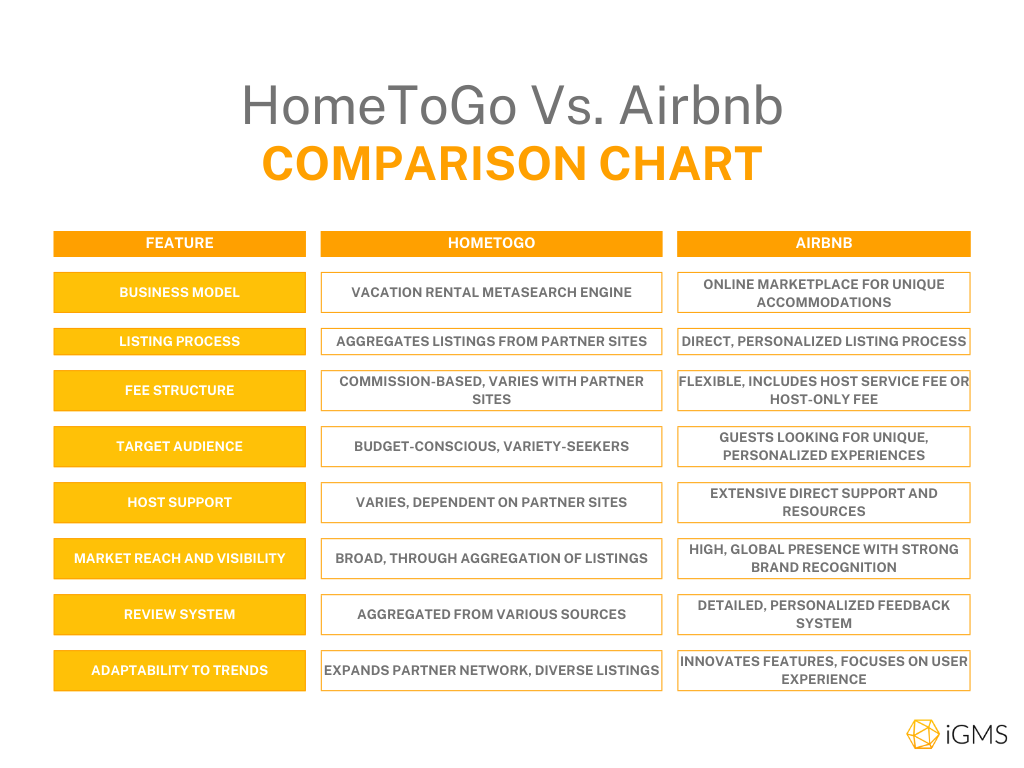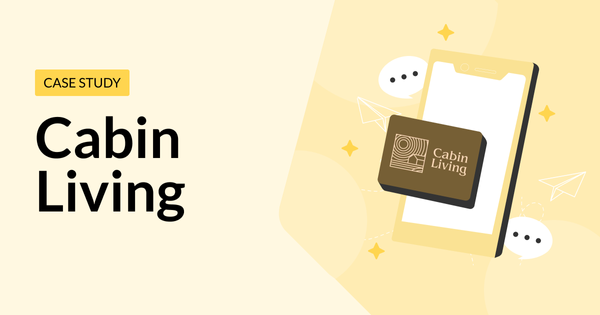HomeToGo vs Airbnb: Which Reigns Supreme in the Vacation Rental Market?

Imagine this: you’re a property owner with a charming beach house on the coast, ready to dive into the lucrative vacation rental market. You’ve heard of Airbnb, a household name for offering exclusive and quirky accommodations, from spare rooms in bustling cities to forest cabins in serene locales.
But then, there’s HomeToGo, a rising star among vacation rental metasearch engines, pulling listings from various sites and promising more bookings through its multi-channel distribution strategy. As a savvy host, you’re left wondering: in the dynamic world of short-term rentals, which platform, HomeToGo or Airbnb, better suits your needs for listing your vacation home?
This article is your guide, comparing these two giants in the vacation rental space, considering everything from service fees to the booking process. Let’s unravel this puzzle and help you make an informed decision for your property management endeavors.

Understanding HomeToGo and Airbnb
Let’s delve into understanding HomeToGo and Airbnb, two pivotal players in the vacation rental industry.
Airbnb, a familiar name for many, operates as an online marketplace offering a variety of listings, from luxury rentals to unique stays in private rooms. With over 7 million listings globally, it’s known for connecting travelers with local hosts and catering to a diverse audience including business travelers and those seeking a unique travel experience.
HomeToGo, on the other hand, functions as a vacation rental metasearch engine. It operates globally and aggregates listings from different vacation rental websites, offering a broad spectrum of options ranging from traditional vacation rentals to contemporary apartments. It simplifies the process of comparing prices and facilities across different platforms, allowing users to search for and find accommodations that meet their specific needs and preferences and making it a go-to for travelers who want to explore multiple options in one go.
Each platform has carved out its niche, appealing to different segments of the market and providing varied opportunities for property managers and owners.
Listing Properties: Ease and Accessibility
Now, let’s talk about listing properties on HomeToGo and Airbnb, focusing on the ease and accessibility for hosts.
HomeToGo: Simplified Listing for Diverse Options
Listing your property on HomeToGo is straightforward. As a metasearch engine, it pulls your listing from its network of partners, including the likes of Booking.com and VRBO. This means if your property is already on one of its partner sites, it automatically becomes discoverable on HomeToGo. This setup broadens your reach, allowing potential guests to compare prices and amenities from various sources, enhancing the visibility of your rental.
Airbnb: Direct and Personalized Listing Process
Airbnb’s listing process is more direct. You create a profile for your property on their platform, which allows you to showcase unique aspects of your rental, like exclusive amenities or quirky decor. Airbnb’s platform is designed to highlight the uniqueness of each listing, appealing to guests looking for something more than just a place to stay. Their system is user-friendly, guiding you through each step to ensure your property is presented in the best possible light.
Both platforms offer different approaches to listing properties, with HomeToGo focusing on aggregation and Airbnb on direct, personalized listings. Understanding these nuances is key for property managers and owners to effectively navigate the vacation rental space.
Fee Structures and Earnings
Understanding the fee structures and potential earnings is crucial for hosts when choosing between HomeToGo and Airbnb.
HomeToGo: Commission-Based Earnings
HomeToGo’s fee structure is typically commission-based, deriving from its role as a metasearch engine. This means you, as a host, pay a percentage of each booking to HomeToGo. The specific rates can vary, but it typically ranges from 10%-15% of the total booking cost. This model is straightforward, aligning HomeToGo’s earnings with your success.
Airbnb: Flexible Fee Options
Airbnb offers a couple of fee structures. Their service fee structure includes a split fee, where guests pay about 14% of the listing price and hosts pay a 3% fee on the booking subtotal. The most common is a host service fee, a percentage of the booking subtotal, which can vary based on factors like location and cancellation policy. Additionally, Airbnb provides a host-only fee option where hosts pay a 14-16% commission and guests aren’t charged any booking fee.
Both platforms have their unique fee structures that can impact your net earnings. Evaluating these alongside your pricing strategy and target market is key to maximizing your returns in the vacation rental market.
Target Audiences
When considering HomeToGo and Airbnb, understanding their target audiences and how this affects booking rates is key for hosts.
HomeToGo: A Diverse Audience with Emphasis on Price Comparison
HomeToGo attracts a wide audience, primarily due to its ability to compare prices and features across various rental sites. It’s particularly appealing to budget-conscious travelers and those looking for traditional vacation rentals. This broader appeal can lead to a steady stream of bookings, particularly for properties in popular vacation destinations.
Airbnb: A Unique and Experience-Seeking Audience
Airbnb is known for attracting guests looking for unique experiences and exclusive accommodations. This can range from luxury rentals to quaint, local stays. The platform’s focus on providing unique stays may lead to higher booking rates for properties that offer something special or different.
As a host, aligning your property with the right platform can make a significant difference in your booking rates and overall success in the vacation rental market.
Host Support and Resources
In the evolving vacation rental industry, the support and resources offered by platforms like HomeToGo and Airbnb can significantly impact a host’s experience and success.
HomeToGo: Partner Network Support
HomeToGo’s approach to host support is unique due to its nature as a metasearch engine. It leans on the support systems of its partner vacation rental sites. This means the quality and extent of support a host receives can vary based on the primary listing site. For hosts, it’s important to understand and utilize the resources provided by these partner sites effectively.
Contact: host-relations@hometogo.com
For more detailed support and contact information, you can visit HomeToGo’s Help Center.
Airbnb: Direct and Extensive Host Resources
Airbnb, in contrast, provides direct and extensive support to its hosts. With a range of resources including detailed hosting guides, a vibrant community forum, and dedicated customer service, Airbnb aims to empower hosts, both new and experienced, in managing and optimizing their listings in the vacation rental space.
For more detailed support and contact information, you can visit Airbnb’s Help Center.
For hosts navigating the HomeToGo vs Airbnb landscape, evaluating the type and level of support and resources each platform offers is crucial for making informed decisions and ensuring a smooth hosting experience.
Market Reach and Visibility
In the vacation rental industry, the market reach and visibility of platforms like HomeToGo and Airbnb are crucial for hosts.
HomeToGo: Broad Reach Through Aggregation
HomeToGo’s strength lies in its aggregation model. This model has led to HomeToGo having over 15 million offers across thousands of trusted partners globally. By consolidating listings from various vacation rental websites, it offers extensive market reach. This approach increases the visibility of your property across multiple platforms, potentially attracting a wider audience of travelers.
Airbnb: High Visibility with a Global Audience
Airbnb’s global presence and strong brand recognition offer significant visibility, with over 4 million hosts worldwide. The platform has been successful in attracting a diverse user base, with 36% of its guests aged between 25 and 34, a presence which can lead to higher exposure for your listings. Airbnb’s marketing efforts and user-friendly interface contribute to its prominent position in the vacation rental market.
For hosts, understanding the market reach and visibility offered by HomeToGo and Airbnb is key to maximizing the potential of their vacation rentals.
User Reviews and Trustworthiness
In the vacation rental industry, user reviews are a cornerstone of trustworthiness for platforms like HomeToGo and Airbnb.
HomeToGo: Diverse Reviews from Various Sources
Since HomeToGo aggregates listings, the reviews are also aggregated from various partner sites. This provides a broad spectrum of feedback, reflecting the diverse experiences of users across different platforms. However, this also means the review system’s consistency may vary because the review criteria and format might differ from site to site, leading to inconsistency in the way reviews are presented and assessed.
Airbnb: Detailed and Personalized Reviews
Airbnb’s review system is known for its detail and personalization. Guests and hosts can leave detailed feedback, building a trustworthy profile for each listing. This level of specificity in reviews helps future guests make informed decisions and adds credibility to hosts’ offerings.
For hosts, leveraging these reviews and maintaining a high level of service can significantly enhance their reputation and success on either platform.
Adapting to Industry Trends: HomeToGo vs Airbnb
In the dynamic vacation rental industry, keeping pace with trends is key.
HomeToGo: Embracing Flexibility and Diverse Listings
HomeToGo adapts by continuously expanding its partner network, the latest notable addition being SECRA, a vacation rental travel tech provider, according to ShortTermRentalz. This inclusivity and flexibility make it an attractive option for both travelers and hosts, catering to evolving market demands.
Airbnb: Innovating and Personalizing Experiences
Airbnb focuses on innovation and personalization. It frequently updates its platform to enhance user experience and introduces new features to meet changing traveler preferences, like offering experiences beyond just accommodations. Airbnb has introduced a new category called “New” which showcases homes added to the platform within the past 10 weeks. This feature allows travelers to find affordable listings, as hosts often set attractive prices for their newly listed homes.
Both platforms demonstrate a commitment to evolving with industry trends, ensuring they remain relevant and competitive.


Final Thoughts
Wrapping up our exploration, it’s clear that each platform offers distinct advantages for hosts in the vacation rental market. As a host, choosing between HomeToGo and Airbnb hinges on your unique needs.
If your goal is broad exposure across multiple platforms and reaching budget-conscious travelers, HomeToGo’s model of aggregating listings could be ideal for you. However, if you’re keen on attracting a diverse audience with a penchant for unique and personalized stays, Airbnb’s global reach and brand strength might be more aligned with your objectives. Consider your property type, the audience you wish to attract, and your personal hosting style to decide which platform aligns best with your goals.
For hosts looking to optimize their rental management, consider exploring iGMS, a tool designed to streamline and enhance your hosting experience.
About the Author
Danielle Kruger is the Content Manager at iGMS. She is an avid reader and researcher of all things travel, always trying to keep her finger on the pulse of the latest trends and innovations. A self-proclaimed nerd, in her free time Dani enjoys reading, rollerskating, and dabbling in tabletop RPGs.






